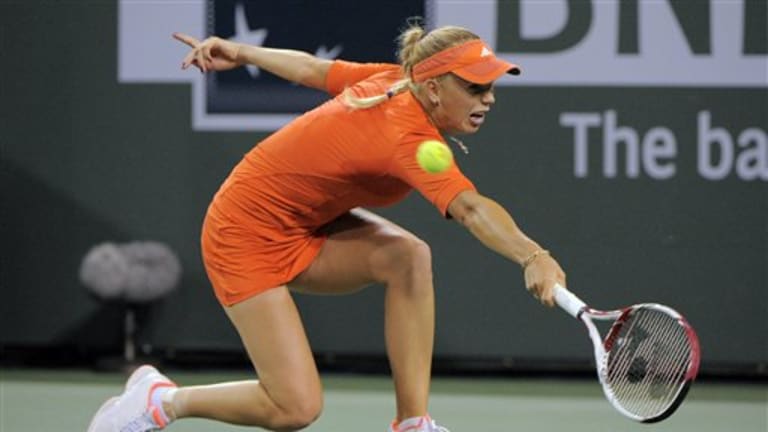by Pete Bodo
Perhaps this item that ran on Page Six of today's New York Post sums up Caroline Wozniacki's problem: Under the "Sightings" heading, sandwiched between items on disgraced former New York Congressman Anthony Weiner wandering around Barneys and Michael Douglas, Catherine Zeta-Jones, and Jann Wenner dining at Elio's: "Golf's top-ranked Rory McIlroy and girlfriend Caroline Wozniacki dining in the private wine room at Philippe Miami. . . "
You know, that Wozniacki girl—what was she again, a stewardess, tropical disease specialist, a waitress at Hooters?
Granted, you can't expect a gossip columnist to have the WTA Top 10 committed to memory, but it's not like we're talking about, oh, Agnieszka Radwanska or Marion Bartoli here. Wozniacki was the WTA year-end No. 1 for two successive years (2010 and 2011). The WTA tried its dangest to make her its "it" girl, and she complied. You won't find a more fan-, sponsor-, and media- friendly player in the WTA.
Still. When it rains it pours, and the unintended slight brings Wozniacki's dilemma into focus. It could have been worse. The column might have identified her as we here and so many others so often have, as "the only two-time WTA year-end No. 1 who never won a Grand Slam"—and who will soon fall to as low as No. 6 or 7 in rankings. It will be lowest ranking for the 21-year-old since she was teenager. It's painful, like watching someone tumble down a flight of stairs.
That latest downtick is the result of Wozniacki having lost at Indian Wells a few days ago to another former No. 1—but one who has that precious major (French Open) that no one can ever take away, Ana Ivanovic. It was a particularly cruel way for Wozniacki to experience this latest setback, given that Ivanovic herself had fallen hard, and ultimately much further than No. 6 or 7, not long after she reached the top.
Did I hear the word, "omen?"
"It's not like it's a disaster," Wozniacki said after that disaster against Ivanovic, during a press conference in which she had to fight back tears more than once. "I've been playing pretty consistently and just want to take the next step. But my time will definitely come again."
This is what Wozniacki has been saying for some time now, keeping to true north while her ranking has headed due south. You can hardly blame her. It has to be the way she looks at things, even though many observers feel that her time has come—and perhaps even gone—because of her reluctance to acknowledge that something vital is lacking.
We've discussed her coaching situation and the debate about what her game lacks numerous times in this space, and there's no point rehashing it. Let's just say that she seems to be convinced that her game is good enough to win majors, as is.
The funny thing about it is that I believe this may be true. It's those mysterious intangibles that may be inadequate.
The most troubling thing about Wozniacki's attitude is that losing big matches never really appeared to hurt her—or the part of her that ought be affected by such things. She's never had that Jimmy Connors "I'll follow that s.o.b. (Bjorn Borg) to the ends of the earth"-moment. She's processed, absorbed and in many ways rationalized her shortcomings and losses in a very smooth way. And that's just something that a natural-born champion doesn't do, as much as he or she hates to lose and conveniently has a bad memory for such unpleasant episodes.
The WTA annual rankings archive is littered with women who were very strong Top 10 players but just didn't have what it takes to win majors. In some cases, there's just a kind of smallness to the player; you just know she doesn't think big enough to win majors. In other cases, the critical missing component is the kind of burning ambition that will drive a player to make changes and try new approaches not only because they might actually improve her game, but—more important—because they might ramp up her motivation and add that element of confidence and optimism that can facilitate a breakthrough. It also doesn't hurt to let your opponents know that, good as you are, you're a work in progress.
Wozniacki, though, is a work in regress. But we can't expect Wozniacki to break down her game and make radical changes or transformations. She's right when she says that her game is pretty darned good to have gotten her where she is, and by now the foundations of her game are set in stone. But she also needs to realize when she's fiddling while Rome burns, and understand when it's time to take action.
This, in the big picture, is the most troubling aspect of Wozniacki's character as a player, at least for those who expect great things of her. Her relatively unimpressive record in Grand Slam events, and particularly her inability to make the critical breakthrough a majors in 2011, suggest that you can forget about the game and its alleged shortcomings or strengths. Give that Wozniacki game to a Serena Williams or a Maria Sharapova and watch it rain havoc on opponents, watch it yield majors, stimulating journalists to flights of fancy about will, stamina, desire, and intractability.
The problem for Wozniacki is not one of needing to improve her game. Would that it were so easy.
